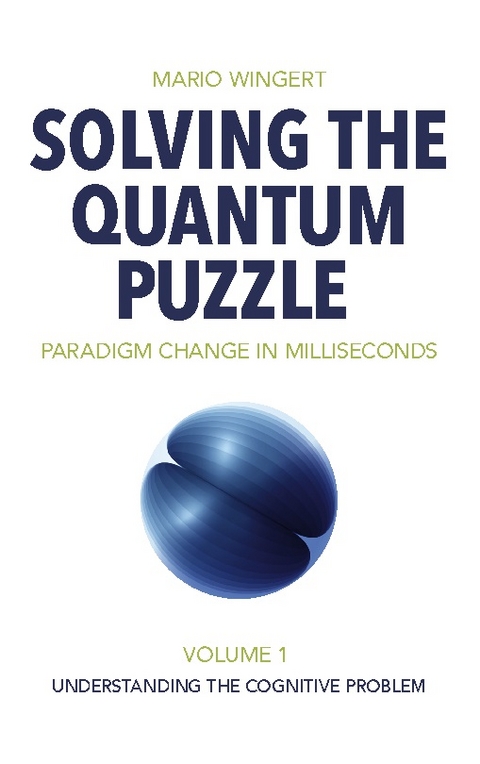
Solving the Quantum Puzzle. Paradigm Change in Milliseconds
Volume 1: Understanding the Cognitive Problem
Seiten
2023
BoD – Books on Demand (Verlag)
978-3-7578-0920-1 (ISBN)
BoD – Books on Demand (Verlag)
978-3-7578-0920-1 (ISBN)
A new interpretation of quantum physics:For 100 years, most physicists have believed that it is no longer possible to understand the true constitution of nature. This is due to the unresolved wave-particle paradox, the apparent contradiction between wholeness and divisibility - that subtle smile of Nature that seemed so confusing that theoretical physics threw in the towel in despair as early as 1927. This was a direct consequence of the Copenhagen Interpretation, in which Niels Bohr had postulated an insurmountable barrier of cognition (at least for physicists).In reality, however, the underlying experiments are of a poignant simplicity that even laymen can understand: They reveal holistic division and branching processes of matter and light. This fact refutes the atomic hypothesis, the hypothesis of indivisibility, on which our current world view is based. This is precisely the fundamental natural philosophical problem of physics: although the experiment clearly proves that the 2400-year-old Greek idea of the existence of atoms - i.e. indivisible particles - cannot apply to nature and reality, we have not yet been able to understand the 'actual punchline of this joke' (Einstein): The key point is simply that physics, like biology, proves the existence of non-mechanical, i.e. holistic division processes, which requires a revolution of physics.Volume 1 introduces the quantum puzzle and identifies the four cognitive problems of quantum physics. They are obviously caused by assumptions that are considered proven, but must nevertheless be false. So we embark on a detective search for clues in the history of ideas in 19th century physics. The investigation reveals, among other things, that the indivisibility hypothesis already failed experimentally justified in the founding days of chemistry, which led Avogadro to the hypothesis of divisible 'atoms', called integral molecules. If we now interpret this divisibility as molecular cell division, the atomic concept becomes obsolete - not only in classical physics and chemistry, but also in quantum theory.
*1961 Dipl. Designer (MA, Industrial Design) Artist (Sculptures), Technology & Science Communication, Design, Creativity and Innovation Consulting, Book Author Science & Popular Science. Focus: understanding the cognitive problems of quantum physics, natural philosophy
| Erscheinungsdatum | 19.11.2023 |
|---|---|
| Reihe/Serie | Solving the Quantum Puzzle. Paradigm Change in Milliseconds |
| Sprache | englisch |
| Maße | 135 x 215 mm |
| Gewicht | 372 g |
| Themenwelt | Sachbuch/Ratgeber ► Natur / Technik |
| Geisteswissenschaften ► Philosophie ► Erkenntnistheorie / Wissenschaftstheorie | |
| Naturwissenschaften ► Physik / Astronomie ► Quantenphysik | |
| Sozialwissenschaften | |
| Schlagworte | Copenhagen • Copenhagen Interpretation • History and Philosophy • History of physics • History of Science • interpretation of quantum physics • interpretation of quantum physics theory • interpretation of quantum theory by Bohr, Heisenberg and Einstein • interpretation quantum • Interpretation Quantum Physics • molecular physics • Molecule Orbital Theory • philosophy of nature • philosophy of science • Physics and philosophy • Popular science • Quantum Physics Quantum Mechanics • Quantum Theory • quantum theory, Bohr, Heisenberg, Einstein, Bagott • quantum theory, molecular physics, cell division, branching • Quantum Theory Quantum Physics Quantum Mechanics • science book quantum theory • science books • science books, ISBN 978375780920, publication date 11-18-2023 • Theorie of Relativity • understanding reality |
| ISBN-10 | 3-7578-0920-3 / 3757809203 |
| ISBN-13 | 978-3-7578-0920-1 / 9783757809201 |
| Zustand | Neuware |
| Haben Sie eine Frage zum Produkt? |
Mehr entdecken
aus dem Bereich
aus dem Bereich
die Grundlegung der modernen Philosophie
Buch | Softcover (2023)
C.H.Beck (Verlag)
18,00 €
Buch | Softcover (2023)
Reclam, Philipp (Verlag)
7,00 €


![Was heißt Denken?. Vorlesung Wintersemester 1951/52. [Was bedeutet das alles?] - Martin Heidegger](/media/113619842)